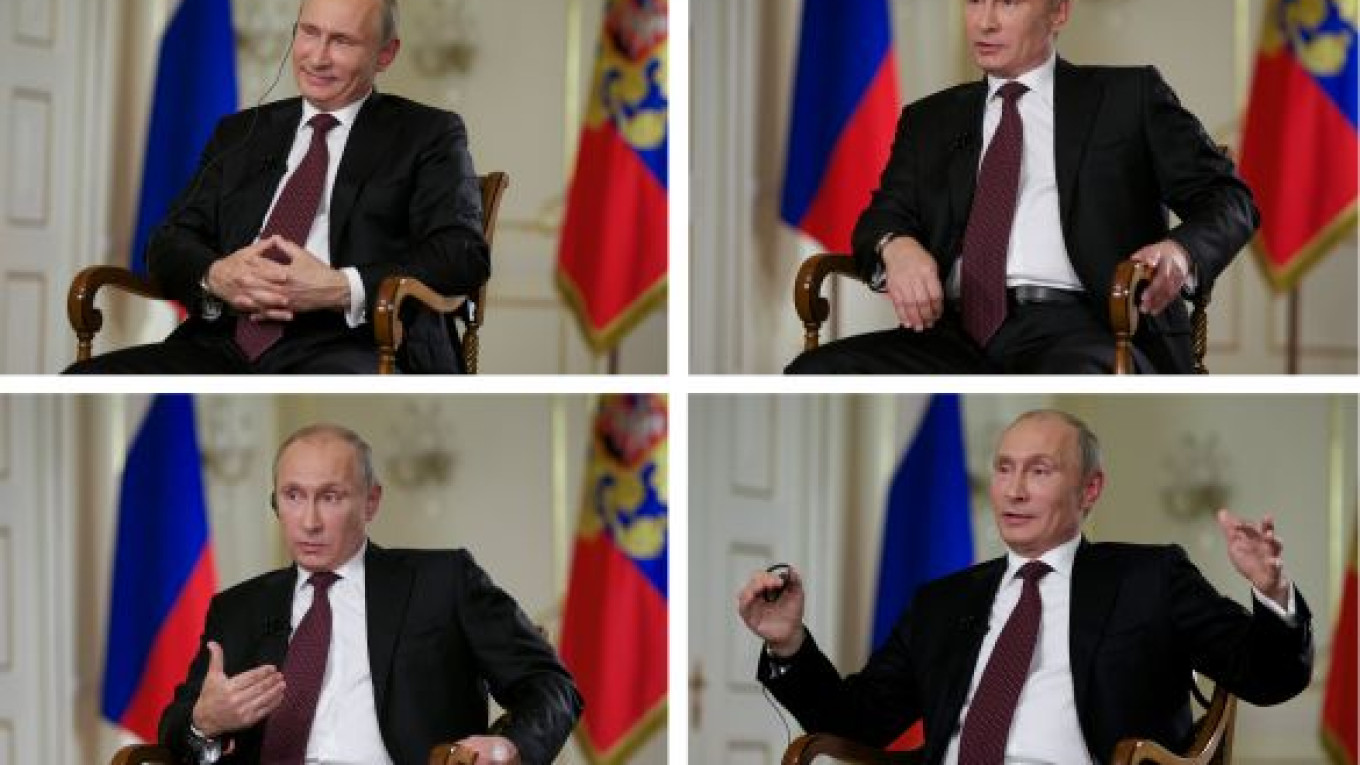As the leaders of the world's major economies are flocking to St. Petersburg for the G20 summit, scheduled to begin Thursday, President Vladimir Putin has reaffirmed his position on the possible U.S.-led military strike in Syria but took a more flexible stance, saying that Moscow could support the campaign.
The Kremlin might back taking action against Damascus only if the move is authorized by the United Nations and is based on “clear proof” that the Syrian government has used chemical weapons, Putin said.
“I don't rule this out,” he said, referring to possible support of the campaign. “If we have objective, precise information about who committed those crimes, a reaction will follow. …We'll take a principled stance, I can assure you.”
The president made his comments in an wide-ranging interview with The Associated Press and state-owned broadcaster Channel One a day before the G20 summit kicks off. A full transcript was published on the Kremlin's website Wednesday.
The comments are “an attempt by Putin to present a more pragmatic line on Syria ahead of the G20 summit while moving away from a position that could be described as purely obstructionist,” said Matthew Clements, a principal analyst on Russia and other former Soviet countries at IHS.
Putin sent a clear message that military action on Syria without support from the United Nations Security Council would be aggression, but his comments also left space for maneuver in talks at the upcoming summit, Clements said.
The president's statement means that Russia does not totally rule out support of the military strike and at the same time does not back the regime of Syrian leader Bashar Assad without caveats, he said.
“Nevertheless, the exact nature of the 'clear proof' Putin requires remains unclear, and it is highly unlikely that Moscow will back any U.S.-led military action,” Clements said.
U.S. President Barack Obama will provide evidence of using chemical weapons by the Syrian authorities to Putin at the G20 summit in a move supposed to persuade Moscow to revise its position on Syria, Secretary of State John Kerry said Tuesday.
“Let’s hope that the summit might produce some change of heart as the president makes the evidence available to President Putin,” he told lawmakers of the Senate Foreign Relations Committee, with Obama seeking congressional approval of a military strike against Syria.
Kerry said he was confident that Obama would have a discussion with Putin on Syria, since the summit would provide “ample opportunity,” RIA Novosti reported.
Putin made it clear that he intended to use the chance to discuss Syria at the summit, but he added that he would not press on making it a top issue on the agenda. He also expressed hope that he would have talks with Obama, who canceled his visit to Moscow slated for this month.
Washington said last month that Obama would skip a meeting with Putin ahead of the G20 summit, as had been planned initially, citing a lack of progress in the two countries' agenda.
The Kremlin attributed the move to the situation around former U.S. intelligence agency contractor Edward Snowden, who was granted asylum in Russia last month.
Instead of negotiations with Putin, the U.S. leader is expected to meet with Russian human rights and LGBT activists. Commenting on his counterpart's agenda, Putin said he welcomed the move, adding that? showing support to civil society is common practice for U.S. policymakers. ?
Asked whether he would be willing to follow Obama's suit, Putin said he was ready to meet with LGBT activists, although no such offers had come.
The statement prompted immediate reaction from the LGBT movement Wednesday, with prominent gay rights activist Nikolai Alexeyev seeking a meeting with Putin.
“Dear Vladimir Vladimirovich! I'm asking you for a meeting to discuss the situation around the LGBT in Russia and globally,” Alexeyev tweeted.
He later added that he had sent an official request to the presidential administration.
Putin's spokesman, Dmitry Peskov, said his boss would contemplate the possibility of meeting with the Gay Pride organizer.
“Putin always supports dialogue. Of course, it's important to determine the subject of the meeting. … But I don't know if we should do it urgently. We should first figure out what the urgency is,” Peskov told Russian News Service. ?
He also added that Putin had no intention to accompany Obama during his meeting with LGBT activists in St. Petersburg and would rather stick to his own agenda.
Amid mounting criticism of what some see as the Russian government's homophobia, Putin distanced himself from any discrimination against sexual minorities taking place in the country. He said he “works with such people” and awards them for achievements in various fields.
“We have absolutely normal relationships, and I don't see anything extraordinary here,” he said.
He also referred to composer Pyotr Tchaikovsky, who is believed to have been homosexual.
“But we love him not for this. He was a great musician, and we all love his music,” Putin said.? ?
Other colorful remarks included Putin's comments on the Russian opposition. But, like in most previous statements, he deliberately avoided calling anti-corruption activist and mayoral candidate Alexei Navalny by name, constantly referring to him as “this gentleman.”
“This gentleman harnessed a very fashionable topic — the fight against corruption. … In order to fight against corruption, one has to be immaculate. But there are problems with that,” he said, adding that he believed Navalny's campaign was an effort to hype the opposition leader rather than improve the political situation.
Despite expressing support for acting Moscow Mayor Sergei Sobyanin, who is also running in the election scheduled for Sunday, Putin said the Kremlin was ready to work with any candidate elected. According to various pollsters, Sobyanin's rating is estimated at 58 to 64 percent, while Navalny has the support of 16 to 20 percent of the voters.
Contact the author at irina.filatova@imedia.ru


